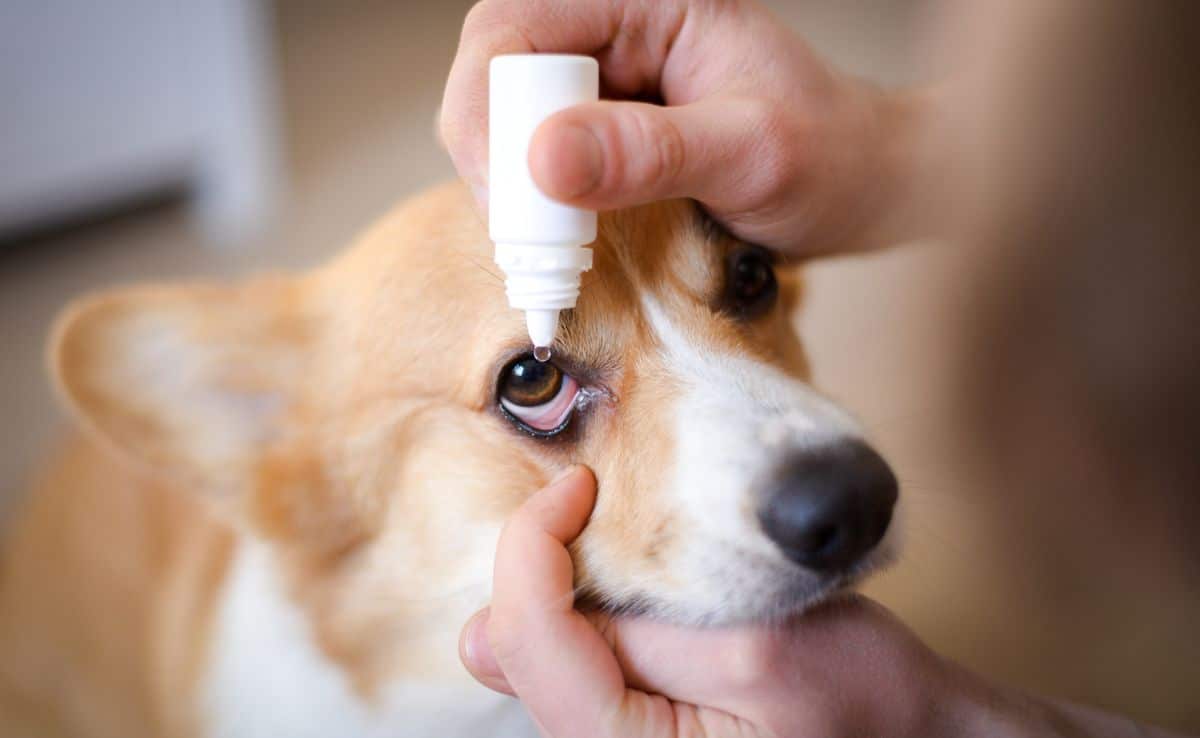Worms In Dogs: Symptoms, Treatment & Prevention
When you purchase through links on our site, we may earn a commission. Here’s how it works.
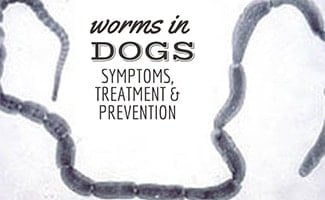
There are a wide variety of worms that can infect your dog: heartworms, roundworms, tapeworms, hookworms and whipworms. Although many of the symptoms are similar, each requires a specific type of medication for treatment.
Table of Contents
Using inappropriate medication to treat worm infestations can worsen symptoms and cause additional medical complications.
Non-Intestinal Worms
The biggest problem for dog owners in terms of non-intestinal worms is heartworms.
Heartworm Disease
Heartworms are parasites that dogs contract through bites from infected mosquitoes. As mosquitoes bite dogs, they transmit heartworm larvae into the dog’s bloodstream. The eggs travel to the dog’s heart, where they settle in the right heart ventricle and begin to duplicate.
As the worms increase in number and grow larger, they begin to cause severe damage to the dog’s heart, lungs and other major organs. Heartworms can live as long as 5 years in a dog, but the infestation usually becomes fatal before then.
Veterinarians most commonly diagnose a heartworm infection by taking blood samples and testing them for the presence of heartworm offspring.
Early signs of heartworm infection can be easy to miss, and it’s often not caught until the infection becomes severe.
Symptoms

- Hair loss
- Jaundice
- Diarrhea
- Respiratory trouble
- Wheezing
- Loss of appetite
- Blindness
- Increased heartbeat
- Vomiting
- Poor coat
- Coughing
- Lethargy
- Weight loss
Treatment
Treating a heartworm infestation is dangerous, and since most cases aren’t caught until dogs exhibit symptoms due to organ damage, treatment can often be fatal. Treatment involves injecting toxins that will kill the heartworms into the bloodstream; however, these toxins can also be fatal in weakened dogs.
Numerous treatments are required to eliminate infestations, and the dog must be kept confined and inactive throughout treatments.
In some cases where heartworm infestations are severe and dogs are too disabled from their condition, veterinarians may suggest forgoing treatment and opting for euthanization. Choosing euthanization may be a difficult decision to make, but dogs experience significant discomfort during advanced stages of heartworm infection.
How To Prevent Heartworms In Dogs
Preventing heartworms is easy with a large number of heartworm tablets and dewormers available for monthly dosage. They vary in price, but all are more affordable than a single heartworm treatment. Some of the most commonly used heartworm preventative medications include:
Pro Tip: Medication Depends On Where You Live
Talk to your vet about the best heartworm preventative for your dog. Depending on where you live, your dog may not need to be on a heartworm preventative all year round. For example, I have my dog on Iverhart Plus from the beginning of spring through the end of fall and don’t give any medication to her during the winter because there are no mosquitoes in Iowa during those months.
Intestinal Worms
Intestinal worms populate the gastrointestinal tract of dogs where they thrive and reproduce, causing a slew of medical side effects. They’re referred to as parasites because they attach to your dog’s intestinal wall and feed by leaching your dog’s nutrients.
If left untreated, infestations of intestinal worms can become deadly by causing intestinal blockage. Your vet should test your dog annually for intestinal parasites through a fecal sample.
All puppies should receive de-wormers to ensure they are not carrying worms or worm larvae. Most of the big-brand heartworm medications also protect against the most common intestinal worm varieties to ensure that fully grown dogs are protected.
Roundworms (Most Commonly Found In Puppies)
Roundworms (also known as Nematodes) are a type of parasitic worm commonly found in young puppies. The majority of puppies have traces of roundworms or roundworm eggs in their tissue at birth as a result of migrating parasites from the mother’s tissue.
Puppies can also contract roundworms from their mother’s milk. This is one of the reasons why puppies are de-wormed as soon as they’re seen by a vet and given their initial “puppy shots.” Many breeders also administer de-wormers to ensure that their puppies remain healthy.
Once within the dog’s body, roundworms travel to the intestinal tract, where they attach to the intestinal wall and continue to grow. Some roundworms can grow as large as 5 inches long. Once roundworms reach sexual maturity, they begin shedding eggs within the dog’s small intestine. Infected dogs will pass roundworm eggs in their feces, and the eggs go on to infect other dogs exposed to the infected feces.
Once dogs ingest the roundworm eggs (these eggs can survive in soil for years), the eggs will hatch, and young roundworms will travel to the lungs. Eventually, the dog coughs the small larvae out of the lungs and swallows them. The larvae then travel to the small intestine to grow to full-sized worms.
It’s easy to see how an untreated infection of roundworms can create a cycle of infection among a neighborhood or kennel of dogs.
Symptoms
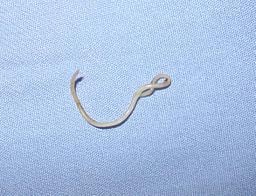
- Bloated stomach
- Poor growth
- Vomiting
- Diarrhea
- Cough
- Pneumonia
- Anemia
- Worms in vomit or feces
- Bloody stool
Treatment
Veterinarians treat roundworms with a de-wormer, but it should be noted: this treatment is only effective for fully grown worms living in a dog’s intestinal tract, not for eggs. It’s important to administer a full course of de-wormer prescribed for roundworms to ensure that you completely eradicate the infestation.
The most commonly prescribed medications for roundworm infestations include:
How To Prevent Roundworms
Preventing roundworms in most dogs is as easy as keeping dogs away from other dog feces and administering a heartworm preventative that also protects against roundworms.
Tapeworms
Tapeworms live within the dog’s intestines and absorb nutrients from the digestive tract through their skin. Like most other intestinal worms, tapeworms attach to the intestinal wall with their heads, though these worms utilize “suckers” to attach to the tissue. Tapeworms are segmented and can have as many as 90 different attached segments and reach as long as 6 inches.
Dogs usually contract tapeworms by eating animals that are infected with tapeworms or by eating fleas that feed on tapeworm eggs.
Each section of the tapeworm can reproduce and contains eggs. As the eggs are released, they’re passed in the dog’s feces. This is often where fleas ingest tapeworm eggs, and the cycle begins again when another (or the same) dog ingest that flea.
As the tapeworm grows, the end segments of the worm’s body will detach, and the containing eggs and sections are excreted. Most pet owners can identify the presence of tapeworms by spotting these small rice-like segments (which are often still moving) in their dog’s fur near their anus. Tapeworms can be spread from dogs to humans.
Symptoms
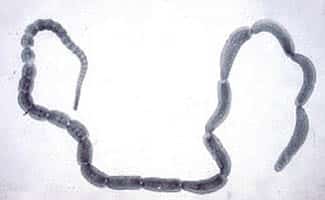
Dogs with a tapeworm infestation may have no symptoms at all, or they may have several general intestinal-type symptoms.
- Itching around the anus
- Vomiting
- Upset stomach
- Diarrhea
- Abdominal discomfort
- Convulsions (in extreme cases)
Treatment
- Drontal Plus
- Panacur–C
- Tapeworm tabs
How To Prevent Tapeworms
Unlike many other worms, tapeworms are not treated with heartworm medications that also cover parasitic worms. Tapeworms can be prevented by applying a flea preventative regularly.
Rodent populations should also be controlled since they can lead to an increase in fleas that feed on tapeworm eggs.
Hookworms
Hookworms are very small worms named because of their hook-like teeth they use to attach to the intestinal lining. They feed upon the host animal’s blood and are the most common parasitic worm found in dogs.
Dogs can contract hookworms in the same way as roundworms, particularly during the puppy life stage. Humans can contract hookworms from their dogs.
Hookworms are much like other parasitic worms in that they lay eggs in the intestinal tract of dogs, and those eggs are then expelled in feces or through a mother dog’s tissues during pregnancy. Hookworm infestations are particularly devastating to young and elderly dogs and should be treated as soon as a vet identifies hookworm eggs (pictured) in a fecal sample.
Symptoms

- Poor stamina
- Poor weight maintenance
- Progressive overall weakness
- Anemia
- Bloody diarrhea
- Unwillingness to eat
Treatment
Common hookworm medications for dogs include:
How To Prevent Hookworms
You can prevent hookworms with many heartworm preventative medications that also treat parasites and by keeping your dog’s environment clean.
Whipworms
Whipworms look like a whip with one end thicker than the other. The thinner end resembles a piece of thread. This type of parasitic worm lives in the first section of the dog’s large intestines (the cecum).
Whipworms can be transmitted to humans from dogs, but it is extremely rare.
Whipworms bury their heads into the dog’s large intestine and feed on the dog’s blood. Once established in the dog’s intestines, whipworms lay their eggs, which get excreted in the dog’s feces. Whipworm eggs are extremely difficult to eradicate from the soil and can only effectively be destroyed by replacing soil. Even picking up feces can leave traces of whipworm eggs behind, leaving other dogs susceptible to infection.
While roundworm females can produce up to 200,000 eggs in a single day, whipworms produce much fewer eggs making detection of an infection much more difficult. Even with the examination of a fecal sample, a veterinarian may miss an infection.
In cases where dogs exhibit clear symptoms of whipworm infestation yet a fecal test comes up negative, additional fecal samples may be required. Whipworms rarely cause fatal infections in dogs, but they can lead to complications.
Symptoms
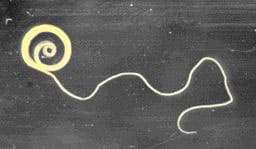
- Anemia
- Diarrhea
- Hemorrhaging
- Weight loss
- Upset stomach
Treatment
You should pick up all feces and replace the soil to avoid re-infection. Common medications for whipworm infections include:
How To Prevent Whipworms
You can use a preventative oral medication to stave off whipworms. Interceptor is currently one of the few heartworm preventative medications that treats whipworms as well as heartworms.
Other Intestinal Parasites To Consider
Many other intestinal parasites can affect dogs. They’re commonly confused with the various worms already mentioned due to a similarity in symptoms.
Coccidia Parasitic Infection (Coccidiosis)
Coccidiosis is a parasitic infection caused by coccidium bacteria. This bacterium spreads through the feces of infected dogs and is most commonly found in puppies that have developed the disease after exposure to an infected adult dog’s feces.
Like many intestinal parasites, coccidiosis can be particularly dangerous to young puppies with under-developed immune systems. Adult dogs can also contract this infection, particularly when undergoing periods of stress such as traveling, moving and even weather changes.
Symptoms
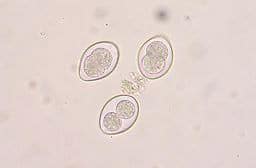
- Watery and mucus-like diarrhea
- Bloody diarrhea (in severe cases)
- Dehydration
- Overall weakness
- Lethargy
Whenever you notice any of these symptoms, it’s crucial to get your dog to the vet, regardless of their age, because symptoms can escalate quickly.
Treatment
The most common test to detect coccidiosis is a fecal examination. The coccidium parasite is easily visible under the microscope — it resembles an eye with a pupil.
After confirming coccidiosis, your veterinarian will assess your dog’s overall health. If your dog is experiencing significant distress due to dehydration and weakness, they will keep your dog for inpatient treatment to administer fluids as well as medications to kill the parasite.
If your dog is in overall good health, your vet will send you home with medication to treat the parasite and suggest administering unflavored Pedialyte and plenty of water to keep your dog hydrated.
Two weeks following completion of medication, your vet will request a follow up fecal test to ensure that the parasite is no longer present.
The most commonly prescribed medications for coccidiosis infestations include:
- Albon
- Bactrovet
- Tribrissen
How To Prevent Coccidiosis
The best way to prevent the spread of coccidiosis is to keep infected animals apart from other animals and to ensure infected animals get treatment. It’s also important to test the feces of pregnant dogs to ensure that newborn puppies are protected from infection. Many people will also test young puppies to ensure they are not infected with coccidiosis after their birth.
Giardia Infection In Dogs
Giardia is a protozoan parasite that dogs ingest when infectious cysts are shed in infected dog’s feces. Infection with the guardian parasite is referred to as giardiasis.
Dogs can ingest these cysts through both direct and indirect contact with them, and once swallowed, they travel down to the dog’s intestinal tract. Many dogs ingest Giardia cysts through water contamination, which is why new puppy owners are advised against letting their dogs near local lakes and water bodies that could house the parasite.
It is important to note that Giardia is the most common intestinal parasite found in the human digestive tract. It is possible for Giardia to be passed from dogs to humans, so proper handling of infected dogs and infected feces is crucial.
Approximately 50% of puppies will develop a case of giardiasis, and close to 100% of dogs that are confined in a kennel environment will contract the parasite. The reason for such a high incidence is the proximity of dogs and the ease of exposure.
Symptoms
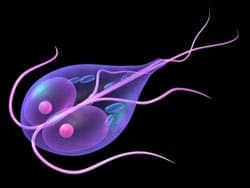
Spotting Giardia in adult dogs can be trickier than with younger dogs since the disease tends to accelerate rather rapidly in younger dogs with less developed immune systems.
- Diarrhea that may be greasy or frothy in appearance
- Diarrhea with mucus in it
- Feces with a strong odor
If your dog exhibits any of these symptoms, it’s crucial to get them veterinary care to avoid dehydration, particularly in the case of very young puppies.
Treatment
Your vet will take a fecal sample to confirm the presence of the Giardia parasite as well as rule out any other potential causes for symptoms, such as maldigestion and malabsorption.
After confirming Giardia parasites, your veterinarian will decide whether or not to keep your dog for observation or whether they can be released for treatment. Your vet may also opt to administer fluids and then send you home to administer medication at home.
In addition to prescription medication, veterinarians recommend bathing infected dogs to prevent any recontamination from remaining parasites on the dog’s coat. Once you complete medication, vets will request a second fecal exam to confirm the parasite’s eradication. This step is particularly crucial since an ongoing Giardia infection can have devastating effects on a dog and can even result in the death of young puppies in a relatively short time.
The most commonly prescribed medications for Giardia include:
- Flagyl, also known as Metronidazole (most favorable, but not recommended in pregnancy)
- Panacur–C
- Valbazen
How To Prevent Giardia
Don’t take young dogs to water bodies where the parasite could be present and ensure that no dog drinks from the water or licks their paws after stepping in the water. Also, ensure that whenever boarding your dog, you pick a kennel that offers individual spaces for dogs rather than communal kennel areas where the parasite can quickly spread.
How To Prevent Worms In Dogs
First, you should speak with your vet about getting your dog on a worm preventative. Most vets offer medicine for you to take home with you, but you can also purchase inexpensive worm preventative medications online.
Second, always pick up after your dog since leaving infected feces can pass the disease to other dogs. You can find the best pooper scooper and poop bags here. Additionally, keep your dog away from other dogs’ feces, especially if they are interested in eating poop! This may mean you need to shorten the leash when you go for walks to keep your dog from sniffing around too much.
